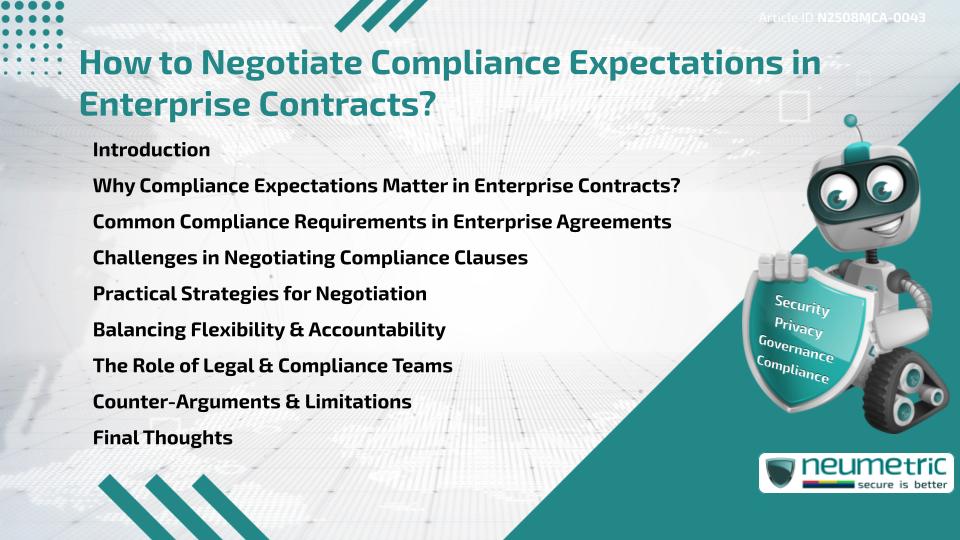Table of Contents
ToggleIntroduction
Understanding how to negotiate compliance expectations in enterprise contracts is crucial for building successful business partnerships. These expectations define the Legal, Regulatory & Ethical Standards that parties must follow, ensuring Trust, Accountability & Risk Mitigation. Poorly drafted clauses can create disputes, Financial penalties & strained relationships. By learning the most common requirements, recognising challenges & applying practical negotiation strategies, Organisations can strike a balance between flexibility & accountability in their enterprise contracts.
Why Compliance Expectations Matter in Enterprise Contracts?
Compliance clauses ensure that both parties uphold their Legal & Regulatory obligations. They can cover issues such as Data Protection, Anti-Bribery, Environmental Laws & Industry-Specific Regulations. Without clearly defined Compliance expectations, companies Risk Legal violations, reputational damage & termination of contracts. In many cases, Compliance Requirements are non-negotiable because they are tied to statutory obligations.
Common Compliance Requirements in Enterprise Agreements
Most enterprise contracts include Compliance provisions related to:
- Data Protection & Privacy (such as GDPR)
- Anti-Bribery & Corruption Regulations (like the FCPA)
- Labor & Employment Standards
- Health & Safety Regulations
- Industry Certifications or Audits
These provisions set the foundation for operational integrity. For example, a Multinational Company may require Vendors to align with ISO 27001 for Information Security Management.
Challenges in Negotiating Compliance Clauses
Negotiating Compliance obligations can be challenging due to:
- Unequal Bargaining Power: Large enterprises often dictate Compliance standards.
- Complex Regulations: Vendors may not have the resources to meet every requirement.
- Ambiguity in Language: Vague terms like “best effort” create uncertainty.
- Cost Implications: Adhering to high Compliance standards often increases operational costs.
These challenges require careful Review & Open Discussion before signing an Agreement.
Practical Strategies for Negotiation
When considering how to negotiate Compliance expectations in enterprise contracts, Organisations can apply these strategies:
- Prioritise Critical Risks: Focus on the most important Compliance areas instead of resisting all requirements.
- Seek Clarification: Ask for clear definitions of terms & obligations.
- Negotiate Proportional Responsibility: Ensure obligations are proportionate to each party’s role.
- Suggest Audits or Reports: Offer to provide regular Compliance updates instead of agreeing to unlimited liability.
- Document Exceptions: Record any areas where Compliance is not feasible, along with agreed alternatives.
These tactics help build balanced Agreements without undermining Compliance Integrity.
Balancing Flexibility & Accountability
A successful contract balances strict Compliance with practical flexibility. For instance, while Data Protection may require absolute adherence, less critical areas could allow for “reasonable efforts”. This balance ensures that businesses can remain compliant without excessive cost or operational disruption. Similar to setting rules in a sports match, flexibility exists, but fair play cannot be compromised.
The Role of Legal & Compliance Teams
Legal & Compliance experts play a central role in reviewing, interpreting & negotiating Compliance clauses. They assess Risks, recommend revisions & ensure obligations align with internal Policies. Involving them early in the negotiation process reduces the Likelihood of disputes & ensures contractual commitments remain enforceable.
Counter-Arguments & Limitations
Some argue that Compliance Requirements unnecessarily restrict innovation & create barriers for smaller Vendors. While this concern is valid, Compliance clauses protect Organisations from serious Risks. However, overly rigid terms can discourage collaboration. Striking a balance requires acknowledging these limitations while emphasising the necessity of Compliance.
Final Thoughts
Understanding how to negotiate Compliance expectations in enterprise contracts requires careful consideration of Risks, obligations & practical realities. By recognising challenges, applying negotiation strategies & involving the right experts, Organisations can ensure contracts are fair, enforceable & aligned with their long-term goals.
Takeaways
- Compliance clauses are essential for Legal & Ethical business practices.
- Common requirements include Data Protection, Anti-Bribery & Industry-Specific Standards.
- Challenges include power imbalances, ambiguous language & cost implications.
- Effective negotiation strategies focus on prioritisation, clarity, proportionality & flexibility.
- Legal & Compliance teams provide critical guidance in drafting & reviewing agreements.
FAQ
What are Compliance expectations in enterprise contracts?
Compliance expectations define the legal, regulatory & Ethical Standards that all parties must follow during the contract period.
Why are compliance clauses important?
They protect Organisations from Legal Risks, Financial penalties & Reputational harm while ensuring ethical operations.
Can Compliance obligations be negotiated?
Yes, but the extent depends on bargaining power, regulatory mandates & the importance of the clause.
What challenges arise when negotiating Compliance terms?
Key challenges include unequal bargaining power, vague language, complex regulations & higher operational costs.
How can smaller Vendors manage strict Compliance demands?
Smaller Vendors can negotiate proportional responsibilities, request phased implementation or offer Compliance Reports as alternatives.
Who should review Compliance clauses in contracts?
Legal & Compliance teams should carefully review, interpret & negotiate Compliance clauses before agreements are signed.
What happens if Compliance expectations are not met?
Failure to meet Compliance obligations can lead to penalties, termination of contracts & potential legal actions.
Need help for Security, Privacy, Governance & VAPT?
Neumetric provides organisations the necessary help to achieve their Cybersecurity, Compliance, Governance, Privacy, Certifications & Pentesting needs.
Organisations & Businesses, specifically those which provide SaaS & AI Solutions in the Fintech, BFSI & other regulated sectors, usually need a Cybersecurity Partner for meeting & maintaining the ongoing Security & Privacy needs & requirements of their Enterprise Clients & Privacy conscious Customers.
SOC 2, ISO 27001, ISO 42001, NIST, HIPAA, HECVAT, EU GDPR are some of the Frameworks that are served by Fusion – a SaaS, multimodular, multitenant, centralised, automated, Cybersecurity & Compliance Management system.
Neumetric also provides Expert Services for technical security which covers VAPT for Web Applications, APIs, iOS & Android Mobile Apps, Security Testing for AWS & other Cloud Environments & Cloud Infrastructure & other similar scopes.
Reach out to us by Email or filling out the Contact Form…


